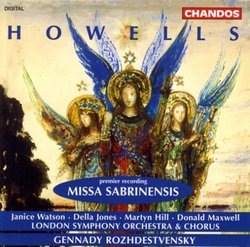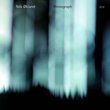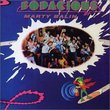| All Artists: Donald Maxwell, Herbert Howells, Gennady Rozhdestvensky, London Symphony Chorus, London Symphony Orchestra, Janice Watson, Martyn Hill, Della Jones Title: Howells: Missa Sabrinensis Members Wishing: 0 Total Copies: 0 Label: Chandos Release Date: 4/18/1995 Genre: Classical Style: Opera & Classical Vocal Number of Discs: 1 SwapaCD Credits: 1 UPC: 095115934821 |
Search - Donald Maxwell, Herbert Howells, Gennady Rozhdestvensky :: Howells: Missa Sabrinensis
 | Donald Maxwell, Herbert Howells, Gennady Rozhdestvensky Howells: Missa Sabrinensis Genre: Classical
|
Larger Image |
CD DetailsSimilar CDs |
CD ReviewsExcellent recording, save for the dynamics Samer T Ismail | Danbury, CT | 01/07/2004 (4 out of 5 stars) "As the previous reviewer notes, Howells' "Missa Sabrinensis" was originally considered unperformable. For the most part, this recording proves otherwise. The work itself is brilliant, at its best moments strongly reminiscent of Howells' best-known work, "Hymnus Paradisi," especially in its use and re-use of themes from earlier in the work. [The "Agnus Dei," for example, is a remarkable reworking of the "Kyrie" that opens the work.]The vocal work here is among the most difficult in modern choral music: the majority of it is contrapuntal or polyphonic, with few of the unison passages common in, say, much of John Rutter's work. For the most part, both the solo quartet and the chorus do an admirable job with this.My one reservation--and it is sadly a major one--lies in the dynamics of the work. Howells was noted for providing detailed scores, full of precise instructions on how it should be performed. For some reason, far too much of this information was ignored in this recording. At times the work suddenly slows down or speeds up for no obvious reason; worse still, there is little, and sometimes no difference, in the intensity of passages marked by "f", "ff", and "fff." As a result, the piece muddles along far too often--a dangerous thing for a work that runs well over an hour.If you're a fan of Howells, this disk is, at the present, a must-have. If not, I'd recommend starting with "Hymnus Paradisi" or Chandos' "Stabat Mater" first." Herbert Howells Missa Sabrinenesis K. Farrington | Missegre, France | 02/11/2000 (5 out of 5 stars) "Chandos must be congratulated on their work to provide the public with a long list of unjustly neglected English composers and their unplayed works. This recording is of a work that was first performed in 1954, the title referring to the River Severn; thus the work could be entitled in English 'Mass of the Severn'. The work was bedevilled by poor performances (it would be extremely difficult to perform with less than top notch performers) and the legend grew up that it was unperformable. Rozhdestvensky proves this is not the case with a stirring performance with orchestra, chorus and soli. The sound world is inherited from Vaughan Williams 'Toward the Unknown Region' and 'A Sea Symphony', big sweeping choral flights and immense orchestral tutti. To this inheritance, however, Howells adds the sound world of Debussy and Delius in his sinous harmonies with their sliding chromaticism which VW dropped after 'In the Fen Country'. The Introit Kyrie is mysterious and brooding whereas the Gloris has the hugeness of Mahler's Eighth Symphony, a vast vision of a universe erupting in praise. This is big stuff indeed and shows that Chandos must have some more goodies in their dusty cupboard to impress even the most jaded critic. If you love the English Choral Tradition you must buy this work. Well done Chandos!"
|

 Track Listings (6) - Disc #1
Track Listings (6) - Disc #1![The Best Of Star Trek: 30th Anniversary Special! Original TV Soundtrack [Enhanced CD]](https://nationalbookswap.com/cd//m/66/5166/255166.jpg)

